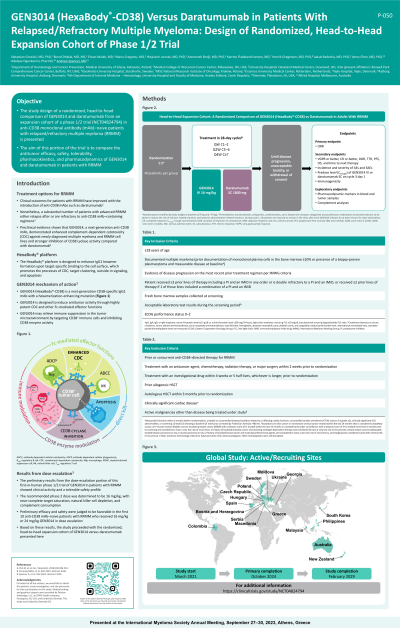Cellular and T cell engager Immunotherapy
Poster Session 1
P-050: GEN3014 (HexaBody®-CD38) Versus Daratumumab in Patients With Relapsed/Refractory Multiple Myeloma: Design of Randomized Head-to-Head Expansion Cohort of Phase 1/2 Trial
Wednesday, September 27, 2023
1:30 PM - 2:30 PM EEST


Andrew Spencer, MBBS FRACP, FRCPA, DM
Professor
Alfred Health-Monash University
Melbourne, Victoria, Australia
Introduction: The approval of CD38-targeted antibodies, such as daratumumab, has changed the treatment landscape for relapsed/refractory multiple myeloma (RRMM). Despite this advancement, patients still progress following daratumumab treatment; therefore, more potent treatment options with higher affinity for CD38 may improve clinical outcomes. GEN3014 (HexaBody®-CD38) is a novel human IgG1 anti-CD38 monoclonal antibody (mAb) that contains the hexamerization enhancing mutation E430G, which facilitates highly efficient complement-dependent cytotoxicity (CDC). In preclinical studies, GEN3014 showed highly potent tumor-cell killing through CDC and was more potent than daratumumab (Hiemstra et al, EHA 2020). Potent antibody dependent cellular cytotoxicity and cellular phagocytosis activity were demonstrated. Preliminary results from the dose-escalation portion of the first-in-human phase 1/2 trial of GEN3014 in patients with RRMM showed a tolerable safety profile and clinical activity, and the recommended phase 2 dose was determined to be 16 mg/kg. Based on these results, the study proceeded with expansion cohorts. Following an interim analysis of 10 anti-CD38 mAb–naive patients with RRMM who had received 16 or 24 mg/kg GEN3014 in the dose-escalation or initial expansion cohorts, an additional 80 anti-CD38 mAb–naive patients with RRMM are to be randomized 1:1 to receive either GEN3014 or daratumumab. Herein we describe the design of the randomized, head-to-head expansion cohort.
Methods: This is a phase 1/2 open-label, multicenter, multinational trial (NCT04824794) designed to evaluate the safety, tolerability, pharmacokinetics/pharmacodynamics, immunogenicity, and preliminary efficacy of GEN3014 treatment in patients with RRMM or other hematologic malignancies. Patients in the randomized, head-to-head expansion cohort must have documented RRMM based on IMWG criteria and ≥3 prior lines of treatment (including a protease inhibitor [PI] and an immunomodulatory imide drug [IMiD]) or ≥2 prior lines of treatment (including a combination of a PI and an IMiD). Patients will receive either GEN3014 16 mg/kg IV or daratumumab 1800 mg subcutaneously in 28-d cycles (C) as follows: QW, C1–2; Q2W, C3–6; Q4W, C≥7 until disease progression or unacceptable toxicity. The primary endpoint of this randomized expansion cohort is objective response rate. Secondary efficacy endpoints include very good partial response or better rate, complete response or better rate, duration of response, time to response, progression free survival, overall survival, and time to next therapy. Patient enrollment is ongoing. Anti-CD38 mAb–naive patients with RRMM will be enrolled from countries outside the United States.
Results: N/A – trial in progress.
Conclusions: N/A – trial in progress.
Methods: This is a phase 1/2 open-label, multicenter, multinational trial (NCT04824794) designed to evaluate the safety, tolerability, pharmacokinetics/pharmacodynamics, immunogenicity, and preliminary efficacy of GEN3014 treatment in patients with RRMM or other hematologic malignancies. Patients in the randomized, head-to-head expansion cohort must have documented RRMM based on IMWG criteria and ≥3 prior lines of treatment (including a protease inhibitor [PI] and an immunomodulatory imide drug [IMiD]) or ≥2 prior lines of treatment (including a combination of a PI and an IMiD). Patients will receive either GEN3014 16 mg/kg IV or daratumumab 1800 mg subcutaneously in 28-d cycles (C) as follows: QW, C1–2; Q2W, C3–6; Q4W, C≥7 until disease progression or unacceptable toxicity. The primary endpoint of this randomized expansion cohort is objective response rate. Secondary efficacy endpoints include very good partial response or better rate, complete response or better rate, duration of response, time to response, progression free survival, overall survival, and time to next therapy. Patient enrollment is ongoing. Anti-CD38 mAb–naive patients with RRMM will be enrolled from countries outside the United States.
Results: N/A – trial in progress.
Conclusions: N/A – trial in progress.
